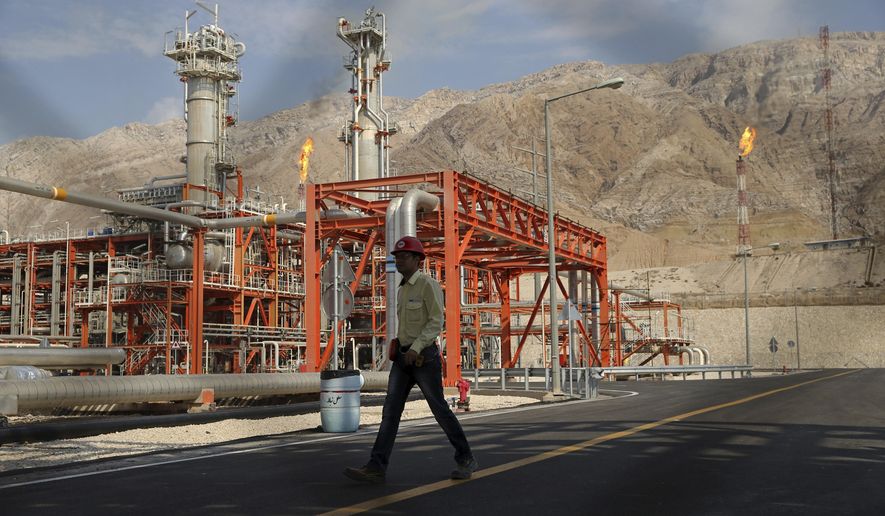Following through on President Trump’s promise to squeeze Iran as he took the U.S. out of the 2015 nuclear deal, the Trump administration on Tuesday announced details on new sanctions that will pressure countries from Europe to Asia to slash imports of Iranian oil to zero by Nov. 4, giving allies no wiggle room to deal with Tehran.
The unexpectedly harsh target rocked markets and caused new consternation by the regime in Tehran, which was already dealing this month with a string of revived popular protests over the country’s weak economy and plummeting currency.
The move also puts new pressure on key U.S. allies such as Britain, Germany and France, which have scrambled to preserve the nuclear accord with Iran — and the promising of an easing of economic sanctions on the regime — in the wake of Mr. Trump’s unilateral decision last month to renounce the accord negotiated by President Obama.
“We view this as one of our top national security priorities,” said a senior State Department official involved in the campaign to tighten the noose on Tehran to reporters in a background briefing Tuesday.
Oil is the lifeblood of Iran, and the overwhelming generator of foreign currency. It’s the third largest exporter among OPEC states averaging sales of about 2 million barrels a day.
A worldwide embargo of Iranian oil would decimate the economy and put intense pressure on the Islamic government of President Hassan Rouhani, who strongly backed the nuclear deal as a way to revive the economy. President Obama imposed similar sanctions on Iranian oil exports in the run-up to the 2015 nuclear deal, but at that time had the backing of leading European allies and China and Russia — all of whom opposed Mr. Trump’s withdrawal from the deal.
Some countries had expected the U.S. to grant waivers that would give them more time to adjust to the loss of a key supplier. But the Trump administration is demanding a complete cutoff by Nov. 4, with the threat of U.S. sanctions slapped on foreign businesses that defy the ban.
“The predisposition would be, ’No, we’re not granting waivers,’” said the official.
But U.S. officials say they have yet to talk directly to China, India and Turkey — three major customers of Iranian crude — about their willingness to abide by American sanctions and stop buying from Tehran.
The ramp-up of sanctions on Tehran follows President Trump’s withdraw from the Iran nuclear deal in May. The crackdown on oil exports is the next phase of a strategy to isolate the mullahs and curb the Iran’s malicious influence throughout the Middle East.
The administration is pushing other oil-producing countries to increase production to ensure global supply is not adversely affected, and Saudi officials said they Tuesday they planned to pump a record amount of crude oil in July, according to the Bloomberg news service. The surge follows an OPEC agreement this week to cool surging global energy prices, but Saudi Arabia has also emerged as a key U.S. ally in the strategy to contain Iran’s ambitions in the region.
But there remain doubts about that other suppliers can fully fill the supply hole left if Iran is blocked from the energy markets.
Oil prices spiked Tuesday on news of the administration’s new sanctions plan, closing above $70 for the first time since May.
European leaders balked at Mr. Trump’s withdrawal from the Iran nuclear deal, but the administration’s sanctions plan announced Tuesday won’t make it easy for them. The U.S. is warning that even non-U.S. business that continue to buy Iran oil after Nov. 4 will be subject to penalties, and already several energy firms and major national suppliers have pulled back from deals with Iran’s energy sector signed in the aftermath of the 2015 deal.
The new sanctions, known as secondary sanctions, are unpopular with many U.S. allies who would have to adjust their polices and force business to remake supply lines. But most countries, including Japan, have signaled a willingness to go along because of their relationship with the U.S., said the official.
When Mr. Trump pulled out of the Iran nuclear deal, which he said was a “bad deal” because it failed to permanently end the nuclear program and failed to restrain Tehran’s adventurism and backing for anti-U.S. proxies throughout the Middle East.
U.S. officials consider Iran a leading state sponsor of terrorism, and say even its non-nuclear activities, including the development of long-range missiles, pose a threat to its neighbors, particularly Israel.
Market analysts say traders were taken aback by the ambition and speed of the Trump administration sanctions plan.
“If U.S. allies cut to zero and India and China also reduce imports, the oil market could lose up to 1.5 million barrels a day of Iranian oil — this is far, far greater than anyone was expecting only a week ago,” said Amrita Sen, chief oil analyst at London-based consultant Energy Aspects Ltd., to the Bloomberg news service.
• S.A. Miller can be reached at smiller@washingtontimes.com.




Please read our comment policy before commenting.